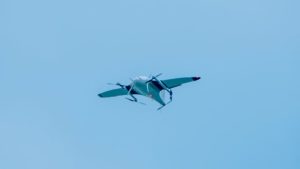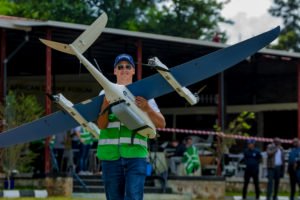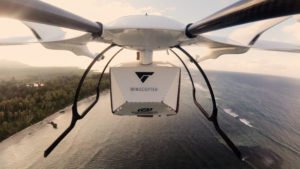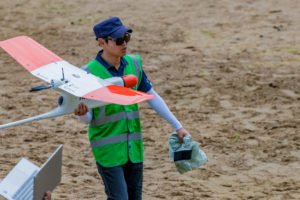The African Drone Forum held a virtual awards ceremony this morning to name the winners of the Lake Kivu Challenge. All of the participants are winners in the African drone industry, having had the opportunity to demonstrate cutting edge technology in real world scenarios before a large audience of global stakeholders.
The Lake Kivu Challenge
The African drone industry is a critical global market, as governments and NGO’s invest in new technologies with the potential to help solve supply chain problems and boost local economies. The Lake Kivu Challenge gave 10 participants from around the world the opportunity to showcase cutting edge technologies in 3 different real world scenarios.
- Emergency Delivery: Teams delivered packages to remote island and returned to base on shore;
- Sample Collection: Teams picked up sample packages from identified spots on a the island, returning to base on shore;
- Find and Assess: Teams surveyed a remote island and identified GPS positions in order to enable a rescue in the case of a natural disaster. Additionally, teams were required to locate and accurately track boats in the water.
Drones were visible to air traffic control at all times: and all flights performed were beyond visual line of sight (BVLOS.)
The Hon. Paula Ingabire, Rwandan Minister of ICT and Innovation, says that the Challenge itself was a significant step for the African drone ecosystem. The challenge “allowed us to understand how these applications can help us to build supply chains and resilience,” said Ingabire. “This is just the beginning: the Lake Kivu Challenge is not just about a competition, but about bringing attention and focus of the international drone industry to Rwanda.”
The Winners
Competitors were chosen after strict screening from over 70 applications – and all participants deserve recognition. (Read more about them here). The winners, however, receive a significant cash prize provided by the World Bank and the U.K. DFID. The World Bank’s Regional Director, Franz Drees-Gross, said that the competition was set up to replicate unique issues and problems of terrain. “Lake Kivu is a setting that is not only beautiful, but one that represents the real challenges that we find in Africa,” said Drees-Gross.
German drone delivery company Wingcopter won the Emergency Delivery category, taking home a prize of £60,000. Wingcopter’s VTOL hybrid scored the highest for the amount of weight they could carry, the time for accurate delivery, as well as airspace safety and the safe preservation of the sample to be delivered.
Wingcopter and Netherlands-based humanitarian drone company Avy also won the competition’s safety award, partly sponsored by on-board detect and avoid company Iris Automation. The prize for the safety award was £5,000 and Iris’ CASIA system.
 Another German startup, Phoenix Wings, won the Sample Pickup part of the competition, flying their unique Manta Ray drone. Competitors were judged on speed, accuracy, safety, and preservation of the samples. Phoenix-Wing’s Jian Wang said the prize is a chance for the startup to demonstrate their capabilities. “This is much more than a competition,” said Wang. “It’s a once in a lifetime opportunity for us.”
Another German startup, Phoenix Wings, won the Sample Pickup part of the competition, flying their unique Manta Ray drone. Competitors were judged on speed, accuracy, safety, and preservation of the samples. Phoenix-Wing’s Jian Wang said the prize is a chance for the startup to demonstrate their capabilities. “This is much more than a competition,” said Wang. “It’s a once in a lifetime opportunity for us.”
Phoenix Wings won an additional £5,000 prize for the Innovation Award, a major achievement in a field of cutting edge technologies.
South Korean company Hojung Solutions took home the prize in the Find and Assess category, one that challenge design consultant Jonty Slater says represented a complex problem. “Teams had to find targets on land and in water – and see how accurately they can do that,” said Slater. Andrew Cho of Hojung said that their company and region are ready to do business in Africa. “This is truly an amazing occasion, it’s a great honor for Hojung to be part of this event,” said Cho. “We really believe that [the African Drone Forum] is not just a stage – but a way for all of us to pave the way for Africa to take a first place in the drone industry.”
Hojung flew the unique South Korean Remo drone – a hand-launched aircraft requiring minimal land infrastructure, with the sophistication to accurately track moving watercraft from the air, a potentially life-saving application around the world.
Two additional £5,000 prizes were awarded for excellence in the Challenge: Rwanda’s LEAPR Labs was granted a prize for data analysis, a critical element of drone missions. The unique delivery drone company Volansi won an airmanship special prize.
Olivier Defawe, Director Health Systems at Village Reach, says that the African Drone Forum and the Lake Kivu Challenge were instrumental in bringing the industry to Africa. “The Lake Kivu Challenge gave companies the opportunity to experience the real life challenges in Africa – this is an event that is helping to accelerate the use of drone technology in Africa.”
Miriam McNabb is the Editor-in-Chief of DRONELIFE and CEO of JobForDrones, a professional drone services marketplace, and a fascinated observer of the emerging drone industry and the regulatory environment for drones. Miriam has penned over 3,000 articles focused on the commercial drone space and is an international speaker and recognized figure in the industry. Miriam has a degree from the University of Chicago and over 20 years of experience in high tech sales and marketing for new technologies.
For drone industry consulting or writing, Email Miriam.
TWITTER:@spaldingbarker
Subscribe to DroneLife here.
https://dronelife.com/2020/05/05/african-drone-industry-winners-of-the-lake-kivu-challenge-announced/
 Unmanned Aerial Vehicle The latest drone news
Unmanned Aerial Vehicle The latest drone news






